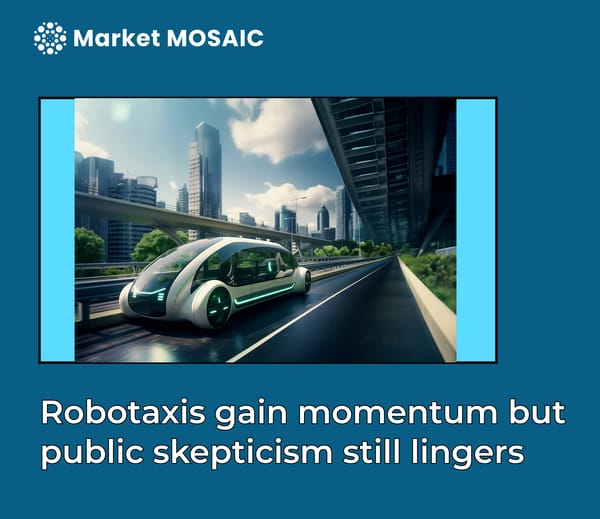Reinventing last-mile delivery to meet skyrocketing e-commerce demand

The e-commerce boom has permanently reshaped consumer expectations around delivery speed, convenience and sustainability. As online shopping becomes the norm across categories, brands are racing to future-proof their last-mile logistics strategies. Failure to provide affordable, rapid fulfilment and sustainable delivery options risks customer churn and brand erosion.
Our latest global consumer survey reveals over 67% now expect same-day or next-day delivery to be available and affordable across most product categories purchased online. In parallel, 57% state sustainability is a critical consideration that would sway their delivery preferences if environmentally friendly options were presented at checkout.
However, brand loyalty remains fickle in this landscape - 71% of shoppers admitted abandoning an intended purchase due to unsatisfactory delivery costs or timing options. Even more concerning, a staggering 83% have returned items due to shipping damages, incorrect orders or excessive delays - straining reverse logistics networks.
Legacy hub-and-spoke parcel delivery models struggle to meet burgeoning consumer demands for cost-effective rapid fulfilment and sustainable logistics. As e-commerce giants like Amazon double down on autonomous vehicles, drones, delivery stations and decentralized fulfilment centres, they are further reshaping customer expectations.
To stay competitive, brands must adopt innovative localized last-mile solutions optimized for rapid urban logistics and cost-efficient automation for linehaul distribution.
The Sustainable City Logistics Equation
Traditional hub-and-spoke parcel delivery networks are proving ineffective in rapidly urbanizing areas with higher population density and e-commerce penetration. A new breed of startups is deploying crowdsourced and micro-mobility models tailored for sustainable last-mile logistics in cities.
Companies like Veho are orchestrating crowdsourced same-day and on-demand delivery, leveraging gig workers on e-bikes, e-cargo bikes and compact electric vehicles. By dynamically matching available spare capacity to orders through intelligent routing algorithms, they optimize speed and efficiency while minimizing emissions.
Others like Urb-it are pioneering sustainable hyper-local urban fulfilment centres staged within significant metros. Instead of packages traversing vast distances, rapid fulfilment allows urban foot couriers on cargo cycles to make emissions-free, cost-effective deliveries within tight time windows.
As cities concurrently implement zoning restrictions to limit emissions and curb congestion, nimble startups are emerging as vital last-mile capacity partners for major logistics players. This enhances speed and sustainable delivery for consumers in dense urban areas.
Automating for Efficiency at Scale
While crowdsourcing models are optimal for last-mile logistics in cities, autonomous technologies and intelligent automation will be paramount to drive cost-efficiency across broader geographies. Amazon's acquisition of Kiva Systems and aggressive investments in autonomous mobile robots (A.M.R.s) have already supercharged fulfilment and delivery sortation efficiency.
We can expect A.M.R.s and robotic piece-picking arms to penetrate all nodes of distribution and logistics networks in the coming years. For linehaul last-mile delivery, autonomous delivery vans and trucks from Nuro, Gatik, and others are being actively piloted to reduce costs for that human-driven portion of the supply chain.
Parallelly, drones from Wing, Zipline and Amazon's Prime Air enable cheaper resupply of decentralized urban fulfilment centres - bypassing traffic for the middle-mile leg of the delivery journey. Eventually, intelligent locker systems, secure home delivery boxes, and even robotic assistants like Amazon Scout could automate the final personal delivery handoff.
Intelligent automation through A.M.R.s, autonomous trucks, drones and robotic assistants will collectively drive faster, cheaper and more sustainable delivery at scale across suburban and rural areas. When coupled with sustainable crowdsourcing logistics in cities, this creates an optimized last-mile delivery network to delight modern consumers.
The Economics of Last-Mile Delivery
Last-mile logistics costs comprise 34% of total supply chain spending for most enterprises today. However, the global market for last-mile delivery solutions and transportation is projected to grow from $170 billion in 2024 to over $400 billion by 2033 - a 10% CAGR over the next decade.
Moreover, it's estimated that by 2030, over 50% of the last-mile delivery market will be controlled by non-traditional players like the crowdsourced and automated startups mentioned. Incumbents will be forced to partner or risk disruption.
Fortunately, for brands willing to invest, the pay-off could be substantial. 58% of consumers are willing to pay premium fees for sustainable same-day delivery options. And 83% desire real-time visibility into order tracking and accurate E.T.A.s.
As e-commerce penetration grows across categories like grocery, furniture, apparel and more, delivering on consumer expectations around speed, cost, and sustainability will be table stakes. By reinventing last-mile logistics through crowdsourced urban models and automated linehaul solutions, brands can secure customer loyalty while reducing supply chain costs.
The future of last-mile delivery has arrived. Is your brand ready to capitalize on this tectonic shift in consumer expectations?




